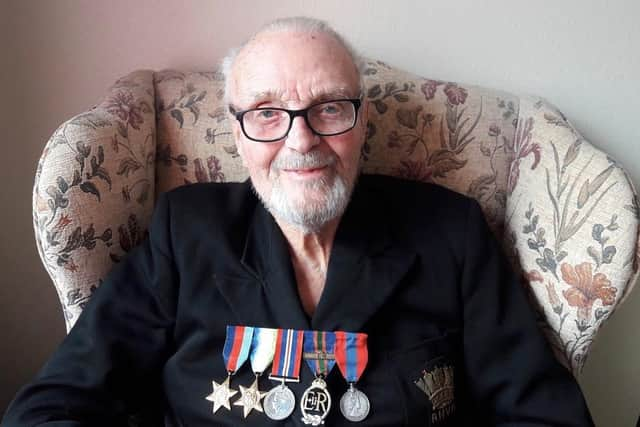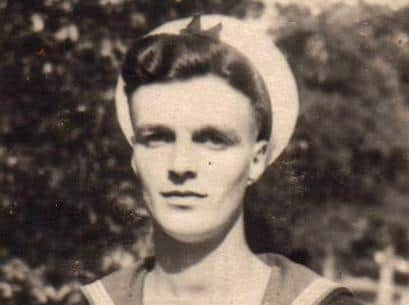'I survived the sinking of HMS Warwick' - War veteran Ken Holmes shares his story
and live on Freeview channel 276
Last week's Courier story of HMS Warwick, the destroyer that saw service in both world wars and was adopted by the town, led to more details being provided to the research team at Unlocking Warwick, the Town Council volunteers, about its sinking by a German u-boat.
They have now been in touch with the last living survivor of the incident who vividly remembers his dramatic rescue as the ship went to the bottom.
Advertisement
Hide AdAdvertisement
Hide AdUnlocking Warwick Secretary, Rick Thompson, said, “Local historian, Terry Gardner, provided more background to the links between Warwick and its adopted warship, and WW2 writer Bill Forster put us in touch with Ken Holmes who was a Wireless Telegraphist aboard HMS Warwick when it was torpedoed in 1944.


"We never imagined we could hear about the end of the town's adopted warship by someone who survived the sinking. His remarkable story is certainly one of determination, bravery and good fortune.
"Ken is now 96 and living in Lincolnshire. He has told his daughter Annie Holmes the story of what happened on February 20 1944 and she has recorded his account in publications of the V and W Destroyer Association.
"Ken is more than happy for us to report some of what he remembers.”
Advertisement
Hide AdAdvertisement
Hide AdA u-boat had been sighted off the north coast of Cornwall and the Warwick was hunting for it.


As the crew were tuning their echo-sounding equipment, the ship was struck in the stern by an acoustic torpedo.
Ken, then aged just twenty, was below decks when the violent explosion shook the ship.
The ammunition magazine and fuel tanks had exploded. He grabbed his lifebelt, which was the type that had to be inflated, and headed for the hatch to the deck.
Advertisement
Hide AdAdvertisement
Hide AdKen recalls, “I could see burning wreckage across the hatch top. Someone cleared it away.
"On the upper deck there was oil, some of it burning. My boss was shouting for people to get to their action stations.
"Mine was in the radio office in the stern. When I looked in that direction I could see the stern was no longer there.”
With its lifeboats out of action, the ship rolled on to its side. Ken managed to inflate his lifebelt, and still wearing his overalls and boots he slid down the bottom of the ship into the sea.
Advertisement
Hide AdAdvertisement
Hide Ad“I arrived in the water amid a flurry of arms and legs belonging to the others who had jumped with me.
"The water was icy cold and came as a bit of a shock, but my first thought was to swim away from the ship before she sank and pulled me down with her. There was a heavy swell on the sea.
"I would go up on one rise, and then down, but I didn't come up quick enough before the next rise, consequently that one came over my head.
"So half the time I was in the water I seemed to be under water as well.
Advertisement
Hide AdAdvertisement
Hide Ad"The oil that covered the top of the water was a problem as well; it meant that I had to make sure it did not get into my eyes. At first I could hear men shouting, but from the time I jumped
into the water I never saw another soul.
"For all I knew I could have been the only survivor.”
Ken watched the ship slide under the waves, with one of his colleagues who couldn't swim sitting on the forecastle.
HMS Warwick had sunk in little over three minutes.
After treading water for some time, he saw a destroyer heading his way, but just as he thought he was going to be saved, the destroyer sped away.
“To make matters worse, a few minutes later she started dropping depth charges, although I was a good distance away, as each one exploded it was like being punched in the stomach.
Advertisement
Hide AdAdvertisement
Hide Ad"I sighted on one of my upliftings on the swell what appeared to be three boats heading in my direction.
"I started to swim towards them. At first I thought that I had done too well as it appeared that I was going to be run down by one of them, but, I adjusted my direction and found myself alongside one of them.
"I raised myself up in the water and shouted. There seemed to be no one on deck, but as I shouted a man came out of the deck house.
"How he saw me I don't know, as the water was covered in oil and so was I. He did see me though and threw me a rope.
Advertisement
Hide AdAdvertisement
Hide Ad"I grabbed it gratefully but was dismayed to find that because of the oil it was sliding out of my hands. I promptly took a turn round my wrists and hung on.
"My saviour must have been a very strong man because he hauled me up the side of the ship with no help from me and threw me on the deck.
"He said something to me in a language I did
not understand and for a few minutes I thought that I was going to end up in a prison camp!
"He realised that I did not understand, and then in English he told me to go down below.”
Advertisement
Hide AdAdvertisement
Hide AdKen had been rescued by a Belgian fishing boat. He was cut out of his clothes and then passed out.
With more than fifty other survivors rescued by three fishing boats, he was taken ashore at Padstow.
Sixty-six other members of the crew did not survive the sinking of HMS Warwick.
“On arriving at Padstow a member of the fishing vessel's crew gave me a pair of trousers and an old blanket to go ashore in.
Advertisement
Hide AdAdvertisement
Hide Ad"I climbed up the ladder to dry land and then realised how lucky I had been to still be alive.
"I owed grateful thanks to the man who had hauled me out of the water.”
With his wireless telegraphy skills, Ken was soon back in action, first in an underground bunker at the Admiralty, then on an aircraft carrier in the Far East.
After the war he returned to his former job in the Post Office and became a Postmaster, and in the Royal Naval Postal Reserve rose to the rank of Lieutenant Commander.
Advertisement
Hide AdAdvertisement
Hide AdRick Thompson said: “His story reminds succeeding generations of the extreme perils faced by those who served at sea during WW2, and of the tragic loss of HMS Warwick – a loss keenly felt by the people of the town that had adopted the destroyer and who had followed her exploits through two world wars”.
If you have photos or information about any of the names on the Warwick War Memorial, contact Christine Shaw by emailing [email protected]
This article was put together with thanks to Ken Holmes, Annie Holmes, Bill Forster and Unlocking Warwick.